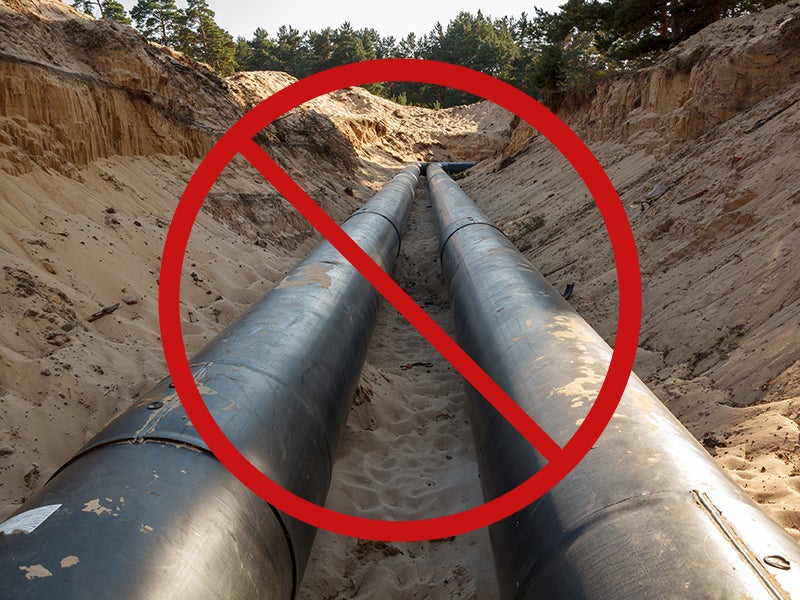In a Big Win for Climate, New York Rejects Fracked Gas Pipeline
State leaders in Albany, NY, have rejected a key permit for a large fossil fuel infrastructure project that would have created a 125-mile pipeline to transport natural gas from Pennsylvania's hydraulic fracturing wells.

This page was published 9 years ago. Find the latest on Earthjustice’s work.
On April 22, Earth Day, world leaders from more than 170 countries gathered in New York City to sign the historic Paris climate treaty. With their signatures, they committed their governments to limit global temperature rise to 1.5 degrees, the level scientists say is crucial for sparing us from the worst impacts of climate change.
Turning this from a signature on a piece of paper to real action will take courage and leadership—from all of us. Luckily, both of those were on display this Earth Day as 150 miles up the Hudson River, in Albany, New York, Governor Andrew Cuomo announced that his administration was rejecting a key permit for a massive fossil fuel infrastructure project—the 125-mile fracked gas pipeline known as the Constitution. The rejected permit is yet another testament to the strength of anti-fracking activists who had bitterly fought the project, which would have spurred fracking in Pennsylvania’s Marcellus Shale. This was the second fracked gas infrastructure project in three months that was defeated at the hands of New York fractivists. And it was the second pipeline in the Northeast to hit the skids that same week. On Wednesday, April 20, Kinder Morgan announced it was dropping plans to build the controversial Northeast Energy Direct pipeline.
In spite of these victories, there are serious hurdles that remain—namely a troubling refusal on the part of officials at the Federal Energy Regulatory Commission (FERC) to account for the environmental impacts of the projects it approves.
Earthjustice has been fighting the Constitution pipeline project in court, representing Riverkeeper, Catskill Mountainkeeper, Clean Air Council, Delaware-Otsego Audubon Society, Delaware Riverkeeper Network and the Pennsylvania and Atlantic chapters of Sierra Club in FERC proceedings.
In March, in spite of a lawsuit by Earthjustice, FERC gave the go-ahead to pipeline developers to clear-cut 20 miles of trees along the pipeline’s planned route through Pennsylvania, much of it on private property and over the objection of landowners. In court papers, we pointed out that this was premature and illegal. The pipeline was far from a done deal: New York State had not yet even agreed to issue a permit and the pipeline couldn’t be built without it.
But with FERC’s OK, accompanied by armed U.S. Marshalls, chainsaw-wielding men cut down trees along the pipeline route, including those on property belonging to the Holleran family. Each year, in late winter, the Holleran family tap the maple trees on their farm, collect the sap and boil it down into maple syrup. FERC wouldn’t even delay the tree cutting to let the Hollerans complete one final sap harvest.
We’ve challenged FERC on a number of fossil fuel infrastructure projects, including the MARC I pipeline in Pennsylvania and the Dominion Cove Point LNG terminal in Maryland. Each time, the agency has rubber stamped its approval, over objections from communities, without even requiring a complete accounting of environmental impacts. Given the fact that FERC’s funding is tied to fees paid by permit holders, critics have started asking questions about conflicts of interest.
As Earthjustice’s Moneen Nasmith told reporters in response to the signing of the Paris climate agreement, “World leaders and our leaders in New York State are doing what’s necessary. Unfortunately, their efforts are undermined by rogue agencies like the Federal Energy Regulatory Commission, which is failing to do its job and evaluate the climate impacts of the massive fossil fuel infrastructure projects it approves. FERC is an outlier agency that, with every day, is exposed as being drastically out of step with its peers.”
“It’s time for fossil fuel industry enablers and apologists to step aside and let the rest of us continue the work necessary to solve the climate crisis and transition our society to 100 percent renewable energy.”
Established in 2008, Earthjustice’s Northeast Office, located in New York City, is at the forefront of issues at the intersection of energy, environmental health, and social justice.